Addition polymer - Study guides, Revision notes & Summaries
Looking for the best study guides, study notes and summaries about Addition polymer? On this page you'll find 492 study documents about Addition polymer.
Page 2 out of 492 results
Sort by
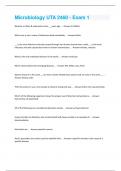 Popular
Popular
-
Microbiology UTA 2460 - Exam 1 questions and answers graded A+
- Exam (elaborations) • 5 pages • 2024 Popular
- Available in package deal
-
- £6.57
- 1x sold
- + learn more
Bacteria, archaea & eukaryotes arose __ years ago... - Answer-2.9 Billion Which one is not a cause of infectious death worldwide... - Answer-Ebola __ is the most infectious microbe caused through non-human transmission, while __ is the most infectious microbe caused by human-to-human transmission... - Answer-malaria, measles What is the only eradicated disease in the world... - Answer-small pox Which choice below lists emerging diseases... - Answer-HIV, SARS, Lassa Fever Species that are i...
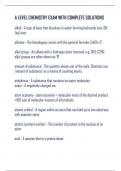
-
A LEVEL CHEMISTRY EXAM WITH COMPLETE SOLUTIONS alkali - A type of base that dissolves in water forming hydroxide ions, OH- (aq) ions. alkanes - The homologous series with the general formula: CnH2n+2. alkyl group - An alkane with a hydrogen atom remove
- Exam (elaborations) • 42 pages • 2024
- Available in package deal
-
- £16.03
- + learn more
A LEVEL CHEMISTRY EXAM WITH COMPLETE SOLUTIONS alkali - A type of base that dissolves in water forming hydroxide ions, OH- (aq) ions. alkanes - The homologous series with the general formula: CnH2n+2. alkyl group - An alkane with a hydrogen atom removed, e.g. CH3, C2H5; alkyl groups are often shown as 'R'. amount of substance - The quantity whose unit of the mole. Chemists use 'amount of substance' as a means of counting atoms. anhydrous - A substance that contains no water mo...
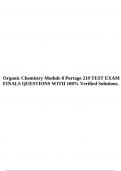
-
Organic Chemistry Module 8 Portage 219 TEST EXAM FINALS QUESTIONS WITH 100% Verified Solutions.
- Exam (elaborations) • 20 pages • 2024
-
- £9.86
- + learn more
Organic Chemistry Module 8 Portage 219 TEST EXAM FINALS QUESTIONS WITH 100% Verified Solutions. Polymer large molecule made by repetitive linking of smaller units (monomers) Macromolecule very large molecule composed of thousands of covalently bonded atoms (ex: polymer) 1. natural (in nature) 2. synthetic (in lab) two ways polymers are made rubber, carbs: starch & cellulose, proteins, nucleic acids DNA, RNA natural polymers nylon, teflon, styrofoam, polyethylene, Dacron, synthetic pol...
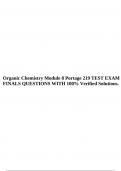
-
Organic Chemistry Module 8 Portage 219 TEST EXAM FINALS QUESTIONS WITH 100% Verified Solutions.
- Exam (elaborations) • 20 pages • 2024
-
- £9.86
- + learn more
Organic Chemistry Module 8 Portage 219 TEST EXAM FINALS QUESTIONS WITH 100% Verified Solutions. Polymer large molecule made by repetitive linking of smaller units (monomers) Macromolecule very large molecule composed of thousands of covalently bonded atoms (ex: polymer) 1. natural (in nature) 2. synthetic (in lab) two ways polymers are made rubber, carbs: starch & cellulose, proteins, nucleic acids DNA, RNA natural polymers nylon, teflon, styrofoam, polyethylene, Dacron, synthetic pol...
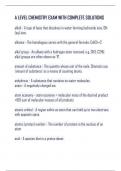
-
A LEVEL CHEMISTRY EXAM WITH COMPLETE SOLUTIONS alkali - A type of base that dissolves in water forming hydroxide ions, OH- (aq) ions. alkanes - The homologous series with the general formula: CnH2n+2. alkyl group - An alkane with a hydrogen atom
- Exam (elaborations) • 42 pages • 2024
- Available in package deal
-
- £16.36
- + learn more
A LEVEL CHEMISTRY EXAM WITH COMPLETE SOLUTIONS alkali - A type of base that dissolves in water forming hydroxide ions, OH- (aq) ions. alkanes - The homologous series with the general formula: CnH2n+2. alkyl group - An alkane with a hydrogen atom removed, e.g. CH3, C2H5; alkyl groups are often shown as 'R'. amount of substance - The quantity whose unit of the mole. Chemists use 'amount of substance' as a means of counting atoms. anhydrous - A substance tha...
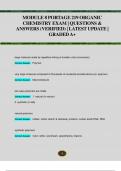
-
MODULE 8 PORTAGE 219 ORGANIC CHEMISTRY EXAM | QUESTIONS & ANSWERS (VERIFIED) | LATEST UPDATE | GRADED A+
- Exam (elaborations) • 21 pages • 2024
-
- £11.91
- + learn more
1 MODULE 8 PORTAGE 219 ORGANIC CHEMISTRY EXAM | QUESTIONS & ANSWERS (VERIFIED) | LATEST UPDATE | GRADED A+ large molecule made by repetitive linking of smaller units (monomers) Correct Answer: Polymer very large molecule composed of thousands of covalently bonded atoms (ex: polymer) Correct Answer: Macromolecule two ways polymers are made Correct Answer: 1. natural (in nature) 2. synthetic (in lab) natural polymers Correct Answer: rubber, carbs: starch & cellulose, proteins, nu...
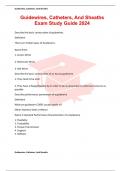
-
Guidewires, Catheters, And Sheaths Exam Study Guide 2024
- Exam (elaborations) • 15 pages • 2024
- Available in package deal
-
- £11.50
- + learn more
Describe the basic construction of guidewires. Definition There are 3 Main types of Guidewires. Name them. 1. Access Wires 2. Maneuver Wires 3. Rail Wires Describe the basic construction of an Access guidewire 1. They tend to be short 2. They have a floppy/flexible tip in order to be as atraumatic to internal structures as possible Describe performance parameters of a guidewire Definition What are guidewire CORES usually made of? Either Stainless Steel or Nitinol Name 5 Sta...
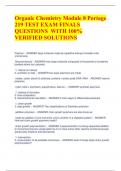
-
Organic Chemistry Module 8 Portage 219 TEST EXAM FINALS QUESTIONS WITH 100% VERIFIED SOLUTIONS
- Exam (elaborations) • 15 pages • 2024
- Available in package deal
-
- £11.59
- + learn more
Organic Chemistry Module 8 Portage 219 TEST EXAM FINALS QUESTIONS WITH 100% VERIFIED SOLUTIONS Polymer - ANSWER large molecule made by repetitive linking of smaller units (monomers) Macromolecule - ANSWER very large molecule composed of thousands of covalently bonded atoms (ex: polymer) 1. natural (in nature) 2. synthetic (in lab) - ANSWER two ways polymers are made rubber, carbs: starch & cellulose, proteins, nucleic acids DNA, RNA - ANSWER natural polymers nylon, teflon, sty...
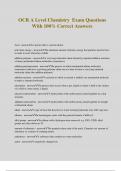
-
OCR A Level Chemistry Exam Questions With 100% Correct Answers
- Exam (elaborations) • 11 pages • 2024
-
- £9.45
- + learn more
OCR A Level Chemistry Exam Questions With 100% Correct Answers Acid - answerA species that is a proton donor. activation energy - answerThe minimum amount of kinetic energy that particles need to have in order to react when they collide addition polymer - answerA very long molecular chain formed by repeated addition reactions of many unsaturated alkene molecules (monomers). addition polymerisation - answerThe process in which unsaturated alkene molecules (monomers) add on to a growing po...
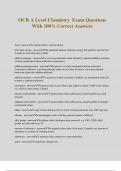
-
OCR A Level Chemistry Exam Questions With 100% Correct Answers
- Exam (elaborations) • 11 pages • 2024
-
- £10.27
- + learn more
OCR A Level Chemistry Exam Questions With 100% Correct Answers Acid - answerA species that is a proton donor. activation energy - answerThe minimum amount of kinetic energy that particles need to have in order to react when they collide addition polymer - answerA very long molecular chain formed by repeated addition reactions of many unsaturated alkene molecules (monomers). addition polymerisation - answerThe process in which unsaturated alkene molecules (monomers) add on to a growing po...

How did he do that? By selling his revision notes on Stuvia. Try it yourself! Discover all about earning on Stuvia


